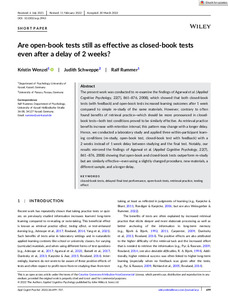| dc.date.accessioned | 2022-08-16T10:14:00Z | |
| dc.date.available | 2022-08-16T10:14:00Z | |
| dc.date.issued | 2022-04-06 | |
| dc.identifier | doi:10.17170/kobra-202206016282 | |
| dc.identifier.uri | http://hdl.handle.net/123456789/14062 | |
| dc.description.sponsorship | Gefördert im Rahmen des Projekts DEAL | ger |
| dc.language.iso | eng | |
| dc.rights | Namensnennung-Nicht-kommerziell 4.0 International | * |
| dc.rights.uri | http://creativecommons.org/licenses/by-nc/4.0/ | * |
| dc.subject | closed-book tests | eng |
| dc.subject | delayed final test performance | eng |
| dc.subject | open-book-tests | eng |
| dc.subject | retrieval practice | eng |
| dc.subject | testing effect | eng |
| dc.subject.ddc | 370 | |
| dc.title | Are open-book tests still as effective as closed-book tests even after a delay of 2 weeks? | eng |
| dc.type | Aufsatz | |
| dcterms.abstract | The present work was conducted to re-examine the findings of Agarwal et al. (Applied Cognitive Psychology, 22(7), 861–876, 2008), which showed that both closed-book tests (with feedback) and open-book tests increased learning outcomes after 1 week compared to simple re-study of the same materials. However, contrary to often found benefits of retrieval practice—which should be more pronounced in closed-book tests—both test conditions proved to be similarly effective. As retrieval practice benefits increase with retention interval, this pattern may change with a longer delay. Hence, we conducted a laboratory study and applied three within-participant learning conditions (re-study, open-book test, closed-book test with feedback) with a 2 weeks instead of 1 week delay between studying and the final test. Notably, our results mirrored the findings of Agarwal et al. (Applied Cognitive Psychology, 22(7), 861–876, 2008) showing that open-book and closed-book tests outperform re-study but are similarly effective—even using a slightly changed procedure, new materials, a different sample, and a longer delay. | eng |
| dcterms.accessRights | open access | |
| dcterms.creator | Wenzel, Kristin | |
| dcterms.creator | Schweppe, Judith | |
| dcterms.creator | Rummer, Ralf | |
| dc.relation.doi | doi:10.1002/acp.3943 | |
| dc.subject.swd | Lerntechnik | ger |
| dc.subject.swd | Vergleich | ger |
| dc.subject.swd | Wiederholung | ger |
| dc.subject.swd | Testtraining | ger |
| dc.subject.swd | Effizienz | ger |
| dc.subject.swd | Lernpsychologie | ger |
| dc.type.version | publishedVersion | |
| dcterms.source.identifier | eissn:1099-0720 | |
| dcterms.source.issue | Issue 3 | |
| dcterms.source.journal | Applied Cognitive Psychology | eng |
| dcterms.source.pageinfo | 699-707 | |
| dcterms.source.volume | Volume 36 | |
| kup.iskup | false | |


